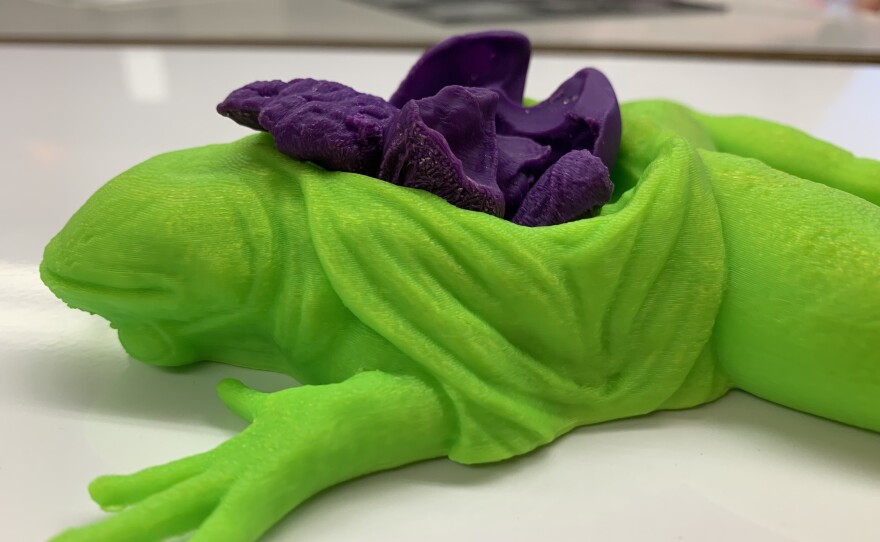Teachers of students who are blind or visually-impaired often have a unique opportunity to help them. Unlike typical classroom teachers, some vision teachers work with students for several years, getting to know them and their family on a deeper level.
Molly Pasley is an assistant professor in NIU’s visual disabilities program. She says that relationship and responsibility make it all the more crucial that their educators come from diverse backgrounds and are able to understand different cultural contexts.
“Blindness does not discriminate. vision loss does not discriminate," she said. "We work with students of all backgrounds."
The Visual Disabilities program at Northern Illinois University’s College of Education just secured $2.5 million in federal funds to make sure their grads can best support visually impaired students from any background.
The new multi-million-dollar federal funding will assist 80 graduate students over the next five years. There are two different specialties available for the Justice, Equity, Diversity, & Inclusion, or “JEDI,” project: “Orientation and Mobility” and “Teacher of the Visually Impaired.”
Pasley says the program, which launches fall 2024, will partner the scholars with NIU’s various cultural centers and diversity mentors.
“We're also trying to add in that intentionality with recruitment in community," she said. "Not just communities of color, but just anyone from diverse backgrounds outside of who is presently in the field."
The justice and equity focus, of course, also extends to people with disabilities like visual impairments. So much of the job of a vision teacher is advocating for their students to get the same opportunities as other kids.
Grace Townsend is a graduate student finishing up her first semester in NIU master's program for orientation and mobility. She’s worked with visually impaired students as a paraprofessional.
“We actually really did have to fight and advocate to get our students more involved,” she said. “There were even assemblies we weren't informed about and so we would have to go to the vice principal or to the principal and just voice that it is important for them to be a part of these assemblies.”

Nathaniel Metzinger is another student in the NIU program. He says that they also have to teach their students how to advocate for themselves -- and showing them how they can speak up is one of the hardest and most crucial parts of the job.
“What I can see from the JEDI program," he said, "is just the skills that I need to learn first, so that way I can be the first step forward for them, so that way they can pick up where I left off and continue to carve their path through."
Pasley says it’s not just a week or two of instruction -- the JEDI principles will be infused throughout the whole program.
Again, teachers of students with visual impairments often get the chance to develop long-term relationships with students and their families -- and she says this instruction positions them to be able to work with anyone.
Dr. Stacy Kelly is a professor in the visual disabilities program. She says she hopes this program will attract more people from diverse backgrounds — and just more people in general. And the federal funding will hopefully make that more feasible. Every student has their tuition and fees covered, along with health insurance and a living stipend.
Kelly says there aren’t nearly enough visual impairment teachers to meet the needs of students who are blind or visually impaired.
“You're actually talking about a crisis, you really are,” she said. “There are children who are blind or visually impaired all over the United States, including within Illinois, who do not have a teacher who is qualified to teach them.”
Jean Deptolla says that’s true. She’s the assistant coordinator of the vision department at The Northwestern Illinois Association. They’re a special education cooperative that provides supports to 70 school districts in northern Illinois.
She says NIU is one of the few programs in the state. And because that pool of candidates is so small, teachers of visually-impaired students try to help as many kids as possible and end up with massive caseloads.
“You would never put 45 kids in a 1st grade classroom. Parents would be battering down the doors if there was one 1st grade teachers for 45 kids,” said Deptolla. “Yet, that is common [with visually-impaired students].”
Fall 2024 applications for the NIU program are now open. Students with disabilities like visual impairments often don’t have a lot of voice in their education. Advocates like Dr. Kelly hope that this program helps teachers to reflect and amplify their students’ voice -- no matter where they come from.



